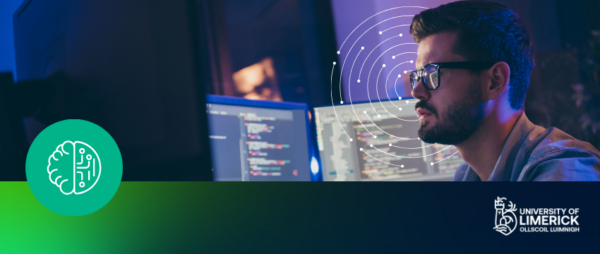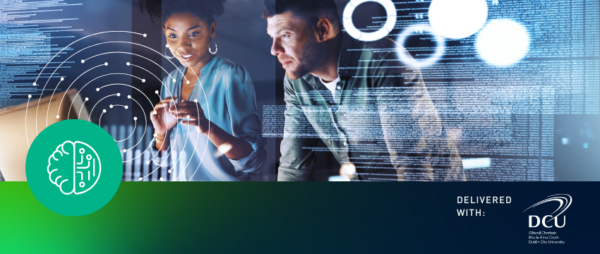Certificate in Emerging Digital Technologies
Embrace tomorrow’s tech, today.
Level 7, 20 ECTS Certificate in Emerging Digital Technologies.
Professionals, managers, and decision-makers who aim to stay ahead of the curve and capitalize on market opportunities must gain a deeper understanding of emerging technologies. With our online Certificate in Digital Emerging Technologies, you’ll gain comprehensive knowledge of technologies such as Artificial Intelligence, Blockchain, and Cybersecurity, among others. This will equip you with the skills to make informed business decisions while also adding to your individual learning portfolio.
In recent years, technology has emerged as a critical factor in the success and growth of businesses across all industries. However, many decision-makers struggle to identify the technologies that can positively impact their business and drive their bottom line. Are you hesitant about investing in technology? Would you like help understanding emerging technologies? Do you want to avoid losing your competitive advantage or being slow to adapt to the new post-Covid business world?
You’re not alone – now is the time to prepare for the future.
- The course is fully online and runs for 1 semester (12 weeks)
- Live online lectures will be scheduled for 4 hours per week (2 x 2-hour classes)
- 2 hours of self-paced directed e-Learning consisting of short videos recommended reading, and tutorial exercises (non-scheduled)
The course is taught over one semester and is delivered completely online through both synchronous and asynchronous directed activities using state-of-the-art technologies and teaching techniques to support the virtual classroom.
Asynchronous directed activities consist of short videos, recommended reading and tutorial exercises. Students are expected to engage with this content each week before their live class to build an understanding and to prompt questions.
The course consists of two modules, Emerging Digital Technologies and Digital Business Transformation.
Emerging Digital Technologies-
Module Content & Assessment
| Indicative Content |
|---|
|
Introduction to Emerging Digital Technologies
• Introduction to all Emerging Digital Technologies (EDTs) • EDT showcase (industry application examples)
|
|
Cloud Computing and Data Analytics for Business
• Machine learning cloud-based solutions • Business application of data analytics
|
|
Artificial Intelligence (AI)
• Key AI definitions and concepts • Artificial Narrow Intelligence • Artificial General Intelligence
|
|
AI for Business
• Business benefits of AI • Process automation • Cognitive insight and automation • Application case studies
|
|
Blockchain
• Defining blockchain and key concepts • Distributed ledgers • Smart contracts • Case studies
|
|
FinTech and Payments
• Introduction to FinTech and FinTech categories • Cryptocurrencies • Applications and case studies
|
|
Robotics and EDT integration
• Introduction to Kinematics, Autonomous systems and Computer vision • Industry and commercial applications (e.g. drones in logistics)
|
|
Cybersecurity, Privacy and Trust
• Security Fundamentals • Principles of Penetration Testing • IT Law and Ethics • Cryptography
|
|
Internet of Things (IoT)
• IoT concepts and standards • IoT hardware • Hardware/software integration
|
|
Virtual, Augmented and Mixed Reality
• Key distinctions between VR, AR and MR • Design principles • Use cases
|
|
Impact Assessment of Digital Emerging Technologies
• Emerging technologies and the impact of technology on society
|
|
Integration of Emerging Digital Technologies in Business
• Innovation and emerging digital technologies • Brief overview of Digital Business Transformation
|
| Assessment Breakdown | % |
|---|---|
| Coursework | 100.00% |
Digital Business Transformation
Module Content & Assessment
| Indicative Content |
|---|
|
1 • Fundamentals of Transformation • Overview of approaches utilised by leading management consulting companies (e.g. McKinsey, Bain, BCG) • Introduction to the analysis of opportunities in global trends and in industry-specific challenges • Review of Emerging Digital Technologies
|
|
2 • Six guiding principles of DBT: transformation, holistic, response, innovation, value, enterprise • Elements of the business case for DBT • Benchmarking tools, e.g. strategy canvas • Porter’s Five Forces Analysis framework
|
|
3 • 17 Sustainable Development Goals (SDGs) framework • Governance, business strategy, business models • Leadership mindset, workforce culture
|
|
4 • Defining value • Value- vs. cost-driven models • Value creation and measurement • Innovation methodologies • Role of culture and mindset • Creative potential within the organisation
|
|
5 • Key stages of the DBT continuum: • Discover, define, ideate, prioritise, plan, execute, evaluate • Key project management principles
|
|
6 • Key stakeholders to involve in the DBT process • Alignment of key resources • Management support • Milestone and expectation management
|
|
7 • Identification of user requirements • Concept and customer experience (UX) design, e.g. customer journey • Prototyping with emerging technologies
|
|
8 • Low vs high fidelity prototypes • Testing the success of DBT prototypes • Beta testing and user validation
|
|
9 • Key metrics for assessment of DBT success • Mapping the value added by emerging technologies • Incremental change as an enabler of transformation: risk tolerance and iteration • Transformation vs change
|
|
10 • Cultivating a culture of reflection • Connecting all the dots: DBT do’s and don’ts • Key lessons learned
|
|
11 • Expanding the scope of the DBT roadmap • Building on what works
|
|
12 • Ongoing opportunities to address societal challenges • Staying nimble to innovate with emerging digital technologies
|
| Assessment Breakdown | % |
|---|---|
| Coursework | 100.00% |
Module descriptors in more detail- HERE
View our information webinar to discover everything you need to know about the course!
Chapter timestamps:
Academic Eligibility
A minimum of a Level 6 qualification on the NFQ (National Framework of Qualifications) is required for standard entry.
For candidates who do not meet this minimum entry requirement, the college operates a Recognition of Prior Experiential Learning (RPEL) scheme whereby applicants may be considered based on relevant work or other experiences.
For applicants whose first language is not English, please note the English language entry requirements.
Fees
Full Course fee: €1,700
Skillnet grant: €401
Student fee: €1299*
Part-funded fees are only available to eligible applicants*.
*Funding Eligibility
Applicants must be working in a private or commercial semi-state organisation registered in the Republic of Ireland(Business, Consultant, Freelancer) to avail of the grant-aided fees. As a government-funded training network, we can only support those meeting these criteria.
Applicants who do not meet our funding criteria may in some cases be able to apply privately/directly to the college and pay the full fee of €1,700 only if there are available places. Contact us for more information.
Click “Apply now” and attach your updated CV to be assessed for funding eligibility.
Alternatively, email info@ictskillnet.ie with the below information:
– Subject line “Certificate in Emerging Digital Technologies”
– Current Employer
– Current Highest NFQ
– Attach your CV
Once approved for funding, applicants will be directed to NCI for their official college application where their academic eligibility will be assessed.
NCI is the final arbiter on who is accepted onto the course.






